Research
Rethinking higher education
Professor Puleng LenkaBula delivered her opening address as the new Principal and Vice-Chancellor (VC) of Unisa at the academic opening of the university on 12 February 2021. The event, which took place on MS Teams and YouTube livestreaming, paused in observance of those who had passed away due to the Covid-19 pandemic.
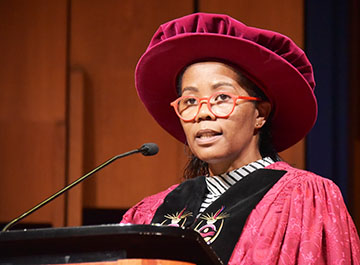
Prof Puleng LenkaBula, Principal & Vice-Chancellor of Unisa
“Our university opening today takes place within difficult conditions as the deadly Covid-19 pathogen is continuing to wreak havoc, mutating and reconstituting itself into variants that are worsening the already evident negative implications of the pandemic for South Africa and the world,” said the new VC.
“The Covid-19 pandemic has disrupted the core business of many institutions and, sadly, many have died from it, including some members of our Council, students, and staff, colleagues, friends, families, and many in our world.”
In her address, LenkaBula highlighted the exposed global socioeconomic challenges typified by high youth unemployment, poverty, gender inequality, and the administrative challenges in many public and private civil societies, including higher education sectors. She said that inequalities became unmasked during the crisis in a way that glaringly and painfully highlighted divides. “These extreme societal distempers are a reminder of a continuous role that higher education systems must play in advancing intellectual formation, socioeconomic transformation, wellbeing, and ecological care through teaching, learning, research innovation, and engaged scholarship.”
The new VC enquired how universities will project their public mandate in such a way that they become constitutive partners in the construction of ideas, inventions, and knowledge systems, aimed at overcoming the eroded economies during this pandemic. “What contributions will we make to preclude death and dying, unemployment, losses of income, hunger, marginalisation, and untold suffering amongst students from vulnerable economic and social strata, and for families and communities whose hopes for the future have been decimated by this pandemic?”
Global impact of the pandemic on universities
LenkaBula told the audience that Unisa, like many other institutions, both local and global, was affected in multiple ways. She mentioned the physical closure of the university where staff had to work from home and stated that because of the physical closure of campuses, many young low-income students, who depend on the university’s libraries or study facilities for conducive space to study and connectivity, lost access to these amenities. She also referred to the online examinations that had an impact on access and success in the pandemic context. “This, in particular, demonstrated the digital divide that has become a glaring challenge that Unisa is currently attending to through the provision of data for our student populace,” she said.
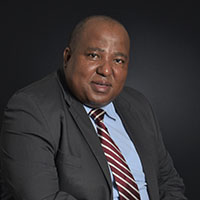 Mashukudu James Maboa delivered his first academic opening address as Chairperson of Council. |
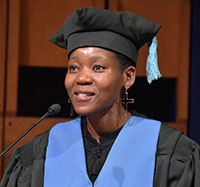 Prof Puleng Segalo (Department of Psychology) directed the programme. |
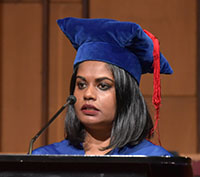 Dr Genevieve James (Deputy Director: Community Engagement) introduced the new Chair of Council). |
“The shift to online tuition will also have a lasting effect on higher education, a challenge we embrace as an important theme in our imaginative ingenuity and strategic gaze,” affirmed LenkaBula.
For the VC, the new abnormal normal, which is pandemic-related, does not only require one to harness resilience and wellbeing but to also tap into the philosophical understanding of ubuntu, which impels us to embrace and care for each other and the planet as we are inextricably bound to each other.
“The abnormal normal allows us the opportunity to rethink higher education in our world. It ushers in an opportunity, a new dawn, a new era in terms of how various institutions, including higher education institutions, should be run. At Unisa, the goal to harness technology in the pursuit of the academic project is among the key features of the institution’s strategic orientation as it asserts its existential essence as the African university in the service of humanity,” she concluded.
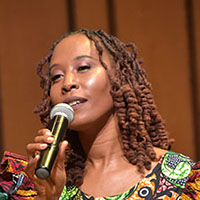 Natalia Molebatsi (Library Services) celebrated the occasion with a poem. |
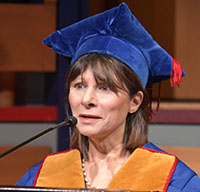 Prof Veronica McKay (Acting VP: TLCESS) presented the University of Oldenburg Certificates. |
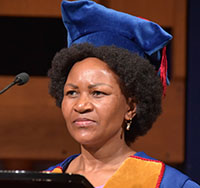 Poppy Tshabalala (CIO and VP: ICT) delivered the vote of thanks. |
Mashukudu James Maboa, the newly appointed Chairperson of Council, who has previously served on the Council, said: “I am both humbled and grateful for the honour accorded to me to be the leader of the Council of this great institution—the one that has historically shaped the futures of so many people in our country, on the African continent, and elsewhere around the globe.”
“Its uniqueness is revealed in its character as a single dedicated comprehensive open learning higher education institution in South Africa,” added Maboa.
“I am also elated that my new role coincides with the term of office of the new VC of Unisa, which is Professor LenkaBula. Her appointment as the first woman VC of this institution, thus making real ‘her-story’, attests to Unisa’s commitment to transformation of the higher education landscape and the need to redress previous injustices referred to in the constitution.”
University of Oldenburg certificates were presented to celebrate those Unisans who completed their Online Teaching and Learning (OTL) Certificate of Advanced Studies, while at the same time having the opportunity to pursue the Master of Education in Open and Distance Learning (MEd in ODL) at Unisa.
Based on a cooperative agreement between the Carl von Ossietzky University of Oldenburg and Unisa, the programme was developed in response to a growing challenge to advance excellence, innovation, and leadership in ODeL teaching, learning and research. The programme contributes to Unisa increasingly being acknowledged in international and national contexts in broadening theorisation in open distance e-learning (ODeL) and informing ODeL practice and policy development.
*By Lesego Ravhudzulo, Journalist, Department of Institutional Advancement
Publish date: 2021-02-13 00:00:00.0


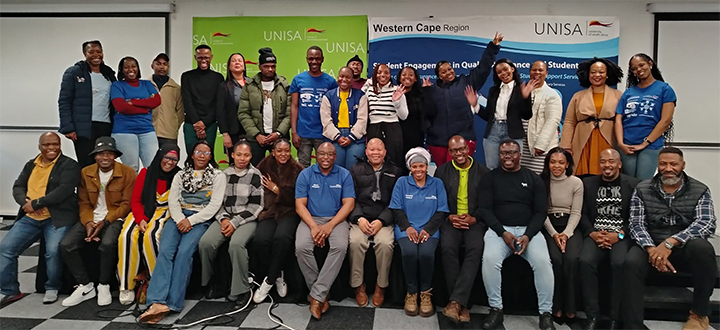 CAS students take centre stage in shaping academic quality and support
CAS students take centre stage in shaping academic quality and support
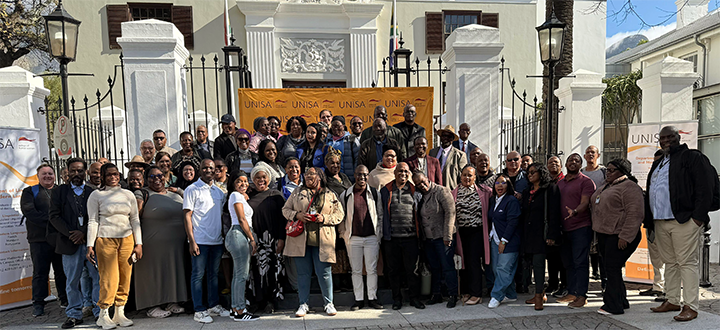 Unisa engaged scholarship project heads to parliament
Unisa engaged scholarship project heads to parliament
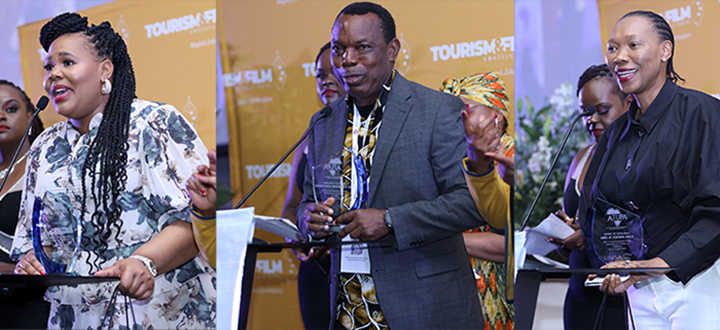 Unisa and ATUPA recognise researchers for ingenuity and innovation
Unisa and ATUPA recognise researchers for ingenuity and innovation
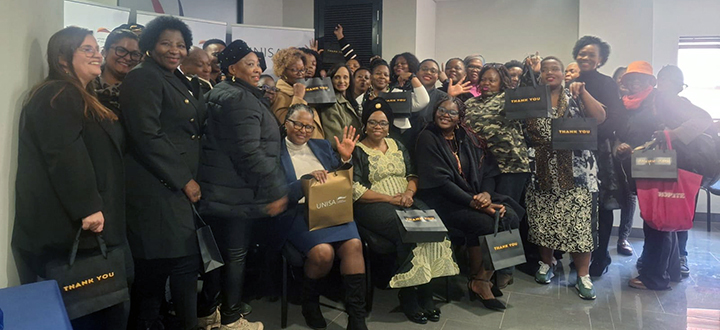 Recognising the unceasing resilience of women
Recognising the unceasing resilience of women
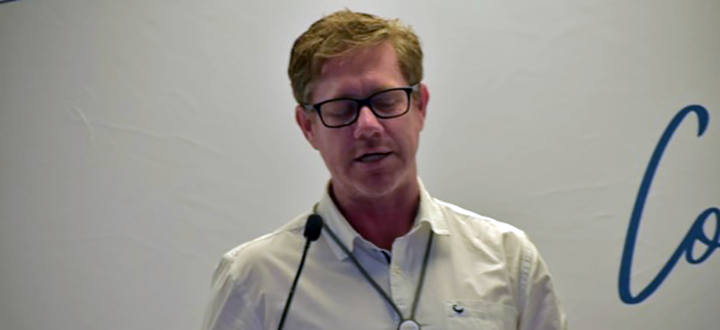 Unisa and SHECASA promote institutional health and safety
Unisa and SHECASA promote institutional health and safety